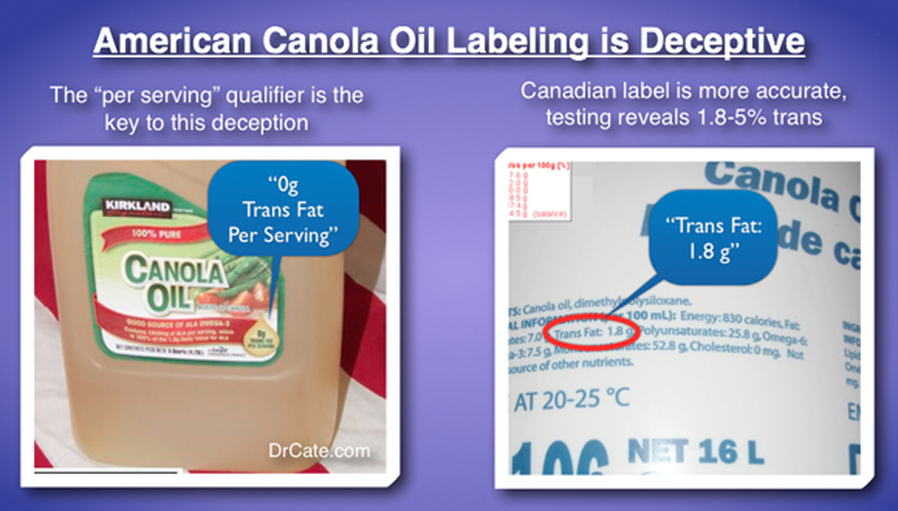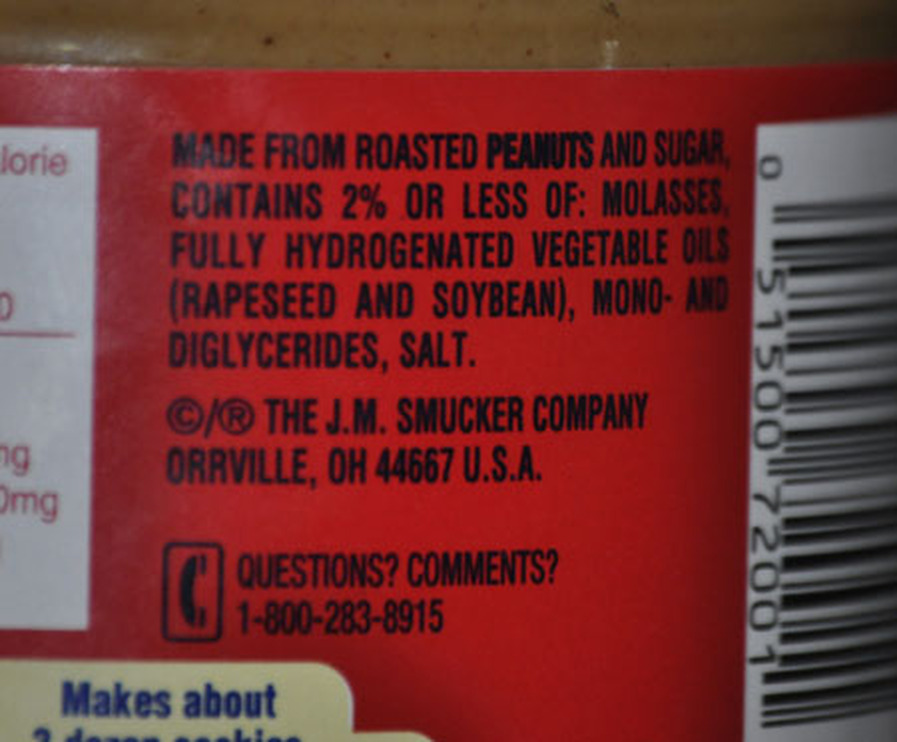
<3 What is lurking in your pantry disguised as a 'healthy' oil? <3
<3 Rapeseed Oil <3 Canola Oil (Canada oil) <3
<3 There is no such thing as a canola plant <3
Canola is a made-up word which stands for “Canadian oil low acid”, and is a genetically modified product. It is a Canadian invention that is backed by the government. It’s a cheap product to manufacture, and many processed or packaged foods contain canola oil.
Canola oil was first bred in the early 1970′s as a natural oil, but in 1995 Monsanto created a genetically modified version of canola oil. By 2009, 90% of the Canadian crop was genetically engineered and as of 2005, 87% of canola grown in the United States was genetically modified.
<3 It is lurking in JIF peanut butter, chocolate, mayonnaise, granola bars, potato chips, baby foods, lunch meats, tortillas, bread, candies, cookies and hundreds of other products <3
Canola oil and canola-based products have been at the center of controversy for quite a few years. While some say that it helps to lower cholesterol levels, it actually has a few nasty side-effects as well (note: Only animal studies have been done regarding the toxic effects that it has on living organisms). Despite no human studies being done, this product was placed on the GRAS (Generally Regarded as Safe) list. It is in fact a by-product of a highly toxic insecticide product.
The real name for Canola oil is LEAR, or Low Erucic Acid Rape, as it has been extracted from Rapeseed oil. This oil is in fact an industrial oil product which has no place whatsoever in our bodies. In light industry, it is also referred to as penetrating oil. Rapeseed oil is also the source for Mustard Gas, which was used as a chemical warfare agent, and was banned after World War 1 for causing severe blistering of the lungs and skin.
To start off, it’s important to note canola oil — which is often produced from GMO rapeseeds — usually ranges between 55-65% monounsaturated fat and between 28-35% polyunsaturated fat. The amount of saturated fat in canola oil is minimal, causing many to market it as a “good” oil on par with olive oil. Even though oils high in monounsaturated fats are typically good for us, the potentially harmful results of consuming canola oil should take this oil of your list of approved oils.
The process of making canola oil actually transforms a potentially healthy oil into an oil that looks healthy but is hiding a dangerous secret. Typically extracted and produced under high pressure, using extreme heat, and with petroleum solvents, canola oil is highly processed and transformed as it is made. In this way, more oil can be produced in a faster time. This process has several determinants:
This oxidizes the polyunsaturates in the oil, increasing free radicals in your body
This can actually force some of the omega-3 content of canola oil to transform into trans fat
It can potentially lead to bowel inflammation, heart disease, weight gain and other health conditions
That’s right: in order to make more oil for less money (and increase their profits), canola oil producers chemically alter the oil as they create it. This allows them to market a product that meets what consumers expect in a “healthy” oil but doesn’t actually live up to its promised health benefits.
Canola is in fact a Genetically Modified food which has been classified as a bio pesticide by the EPA. Like mercury and fluoride, Canola is also not eliminated from the body. It is found in almost all fast foods, convenience foods, chocolate, candies, bread, potato chips, baby foods and formulas, most peanut butters and cookies, frozen French fries, rye breads, chocolate syrups, mayonnaise, granola bars, some vegetarian convenience foods, lunch meats, margarines, movie house snacks, tortillas and most other bakery foods.
Studies done on rats and other lab animals showed that after consuming canola oil, there were fatty deposits that accumulated on their hearts, thyroids, adrenal glands and kidneys. When they stopped consuming this oil, the fatty deposits disappeared, but unfortunately scar tissue remained on the affected organs.
Because it is high in glycosides, canola oil has been shown to inhibit enzyme function. Its effects are known to be accumulative, resulting in side-effects taking years to show up. It is also able to inhibit the metabolism of foods. Being a trans-fatty acid, it is also possible that this man-made oil has a direct link to causing cancer (even from just breathing in the toxic fumes created when frying foods in it).
Rapeseed oil is an acetyl cholinesterase inhibitor. This compound is crucial when it comes to transmitting signals from the nerves to the muscles. This is possibly why there has been a dramatic increase in cases of multiple sclerosis and cerebral palsy over the past few years. Other side-effects which have been reported include respiratory illnesses, loss of vision, constipation, anemia, heart disease, irritability and low birth weight in infants. It is known to severely deplete Vitamin E levels in the body, as well as cause severe clotting of red blood cells, which can pose a serious health risk.
The best way to avoid consuming this toxic industrial by-product is to prepare meals yourself from scratch, and especially avoid fast foods at all costs.
“Like all modern vegetable oils, canola oil goes through the process of refining, bleaching and degumming -all of which involve high temperatures or chemicals of questionable safety. And because canola oil is high in omega-3 fatty acids, which easily become rancid and foul-smelling when subjected to oxygen and high temperatures, it must be deodorized. The standard deodorization process removes a large portion of the omega-3 fatty acids by turning them into trans fatty acids. Although the Canadian government lists the trans content of canola at a minimal 0.2 percent, research at the University of Florida at Gainesville, found trans levels as high as 4.6 percent in commercial liquid oil. The consumer has no clue about the presence of trans fatty acids in canola oil because they are not listed on the label.”
Those are the types of oils you want to avoid like the plague: Hydrogenated and Partially Hydrogenated oils!
Trans fatty acids are the result of this hydrogenation process. These are hazardous by-products, and are health destroyers. You should stop cooking with these oils as well: Corn Oils, Safflower Oils, Soy Oils, and Vegetable Oil.
Food manufacturers are not required by law to tell you if their products contain GMO’s. It’s up to us to be well informed, and read the labels. Monsanto has been incorporating genetically modified organisms in its canola oil seeds, and now we know that Monsanto has also been selling GMO seeds for the following plants:
- Canola
- Alfalfa
- Corn
- Cotton
- Soybeans
- Sugarbeets
How to Choose A Good Oil
- When you’re buying a cooking oil, consider these things:
- Choose a “Cold Pressed” or “Extra Virgin” type.
- Should be available in glass containers.
- The bottle should be a dark color for olive oil, and kept in a dark place once opened.
- Make sure it is GMO-free.
- Go with Organic.
What does Extra-Virgin Mean? It’s simply another way of referring to “cold pressed”, which means that the oil was made by using pressure to extract the oil from the seeds, grains, nuts, etc., and there was no heat utilized during the processing. Heat causes a degrading of the nutritional value of the oil. Extra Virgin also means that no chemical solvent was used, nor was it deodorized or altered in any way.
What Oil to Use Instead? I personally use:
Coconut Oil – coconut oil is best when it’s cold pressed and virgin. Do NOT buy refined coconut oil. Your coconut oil should smell like you’re on a beach in the Caribbean. It has a high heat threshold and contains MCFA’s Medium Chain Fatty Acids that can support fat-loss and your nervous system.
Olive Oil – I don’t recommend Olive Oil for cooking but it has tremendous health benefits and is at the heart of the Mediterranean diet. Look for extra virgin olive oil and use it on salad’s and other cold dishes.
Red Palm Oil — Red palm oil is made from the palm fruit instead of the palm kernel, and in its unrefined state, it is high in vitamin E and beta-carotene. It’s also stable under high heat and great for cooking.
Now that you’re armed with the facts, use them to guard your health! Stay clear of Canola Oil, and all GMO foods.
